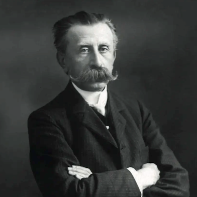All Activity
- Today
-
I really like film music and in many instances, I don’t see it as a distinct genre from classical because several great classical composers also wrote music for film which is played alongside their non-film (like Prokofiev and lieutenant kije), the forces and style are often very similar and in its greatest instances I think film music can achieve the same depths and heights as great classical compositions, and furthermore, there is a very direct evolution from Wagner and incidental music towards cinematic music, as they are fundamentally the same concept. With that said, it can also be really cheesy and cliche, especially today. Nevertheless I have a lot of “highlights” from the genre…in the interest of restriction I’ll just pick one for today.
-
murphybridget started following Overlooked Pieces by Great Composers
-
It's fascinating to explore the lesser-known works of great composers, as they often reveal hidden gems that showcase their talent and creativity in different ways.
-
Henry Ng Tsz Kiu started following wack new 'jazzy' thing
-
PeterthePapercomPoser started following wack new 'jazzy' thing
-
Awsumerguy started following wack new 'jazzy' thing
-
wack new 'jazzy' thing
Awsumerguy posted a topic in Incomplete Works; Writer's Block and Suggestions
I've been taking something of a hiatus from classical music recently. I haven't had any big ideas to go off of when it comes to big orchestral works or even smaller chamber ensemble pieces; I've also wanted to compose small songs/do piano covers/write jazz pieces for quite some time now, and I figured it's about as good a time as any to just get on with it while I rest the classical side of my composing output for now. Don't worry (in case you are 😉), I'm sure I'll come back to it eventually. The piece below is one of my first attempts at writing in a distinctly alternative, non-classical musical language since I first started writing music two and a half years ago. I've been asked by a friend to write some pieces for his student film, and he asked specifically for an 'upbeat jazz'... thing to accompany a scene he plans on filming a couple of months from now. I decided to work with a jazz trio that consists of a drumset, piano, and acoustic guitar (since he planned on having the school band play the piece). I've made an effort to focus more on rhythmic drive and the 'groove' of the piece instead of melody or harmony, and I'm curious if anything here could be considered 'jazzy' at all, or if it's just a jumble of discordant sounds that merely assume the semblance of jazz improvisation. I'm quite unsure of this new writing style, so any constructive criticism is welcome. Hoping to hear from everybody! 😁 Note: the .mp3 only goes up to 1:42, since I haven't finished the piece. There should be a couple more minutes of music after that. -
expert21 changed their profile photo
- Yesterday
-
Nicholas Schuman started following Trio Sonata in Gm
-
Absolutely lovely, listened three times in a row
-
PCC started following Impromptu for Piano solo
-
liked it very much. the only thing I hate is the mechanical computer-generated playback
-
PeterthePapercomPoser started following Draft of a third movement for two pianos.
-
Cafebabe started following Draft of a third movement for two pianos.
-
It's not finished, but i decided to post it anyway
-
PeterthePapercomPoser started following My progress so far
-
Samuel_vangogh started following My progress so far
-
So I finally did it! In june i will have the access test which ive been preparing to for two whole years !!!!!! Im so excited i cant held the tears !! I have to submit several pieces for that and I want to share them with you, this is like a tiny 'concert' in which you can appreciate my development !!!!!!! I ve already posted some of those pieces here, so some of you may already know them I hope you like it !!!!!!!!!!!!!!!!!!!!! (btw, the audio of the first score is broken somehow)
-
What are pieces everyone else likes that you don't?
Aw Ke Shen replied to Monarcheon's topic in Repertoire
and this. sorry tht I missed out. -
Grieg - 4 Album Leaves, op. 28 ( all four are beautiful hidden gems to me ) Some other of his even more obscure Lyric Pieces. Sibelius: - op 24 no 9: Romance in D-flat major - 6 Impromptus, Op.5 (No. 5 Vivace: B Minor) - The Sapin Op.75-5 - Etude In A Minor Op. 76 No. 2 Heino Kaski Night By The Sea - Op 34, No 1 Oskar Merikanto: - Idyll Op. 73 No. 1 - Valse A La Chopin Op. 6 No. 5, in G minor, Piece No. 14 - Merella Op. 47 No. 4 Aarre Merikanto Six Piano Pieces op. 20 ( all six ) --------------------- Still quite well-known, but ( perhaps undeservedly ) much less known than their other pieces: Brahms Rhapsody in G minor, Op. 79, No. 2 Tchaikovsky - October of "The Seasons, Op. 3" and other months other than June.
-

Saltarello in C minor
Quinn St. Mark replied to Quinn St. Mark's topic in Incomplete Works; Writer's Block and Suggestions
Thanks for this, @Henry Ng Tsz Kiu! Interesting video! Actually, I was doing that initially until I noticed that both the Saltarellos in Mendelssohn's Italian Symphony and Saint Saëns' Piano Concerto 2 are in common and cut time respectively. I guess they don't represent a hard and fast rule though, so maybe! Thanks for the heads up. I'm not much of pianist myself at all, so it's useful to hear from others what's actually possible to play. Cheers! -
What are pieces everyone else likes that you don't?
Aw Ke Shen replied to Monarcheon's topic in Repertoire
Very much relate to these sentiments. Though what I more or less hate about overplayed pieces is that they are... overplayed, rather than the piece in and of itself - because many of these overplayed pieces are actually quite universally beautiful in their own ways, it is just that being overplayed makes the pieces lose their luster and even sound annoying to listeners, though at least for me I'd say that their beauty is still not to be denied. -

Saltarello in C minor
Quinn St. Mark replied to Quinn St. Mark's topic in Incomplete Works; Writer's Block and Suggestions
G'day @Thatguy v2.0, I take it you are referring to Pieczonka's? That's a very interesting observation! I'll see what I can pull off 🙂 Thanks heaps! -

Symphony No.1 - First Movement
Aria Donn replied to HoYin Cheung's topic in Orchestral and Large Ensemble
The stylistic juxtaposition just feels a bit jarring to me. One moment it seems like it's going to be a very "conventionally tonal" piece, but even the "emancipated dissonance" sections seem to be approaching that goal with different degrees of respect for tonality. Some parts honestly just sound like wrong notes, while others seem highly logical (in a very Mahlerian sense). It could be a matter of how you juxtapose dissonant sections right next to highly consonant sections and give us a contrast we were not expecting. I actually have no problem with you introducing us to your "big tune" right away -- some of my favorite symphonies do this very successfully, such as Schumann's 3rd. You've got to be sure you have a knockout tune in order to do this, and yours is pretty good, so I don't take issue with any of that. It feels like you are at your most compositionally fluent with the aforementioned Mahlerian type of writing, passing themes around through various sections of the orchestra and giving us this free-flowing swirl of contrapuntal development. These are the passages that feel the most coherent and "natural". I have to say that the manner in which you accompany your themes at other times can come across as pedestrian or even "naked" compared to that dense, flowing counterpoint you offer us throughout a majority of the piece. The texture is just "too simple" when put up against the surrounding context. It might work in a different context but I'm not entirely sure I completely "buy it" in this piece from a narrative standpoint. -
Psalm 100: All People on Earth do Dwell - Finale movement
Hcab5861 replied to Hcab5861's topic in Choral, Vocal
Musescore’s ritards are iffy at best. I usually just write what you see and then hide it with the “v” key, but I forgot to this time, lol -

Psalm 100: All People on Earth do Dwell - Finale movement
Thatguy v2.0 replied to Hcab5861's topic in Choral, Vocal
Yeah I was about to say the same thing about the clefs until I read Guillem's comment. You can also remove your pdf and replace it in the original post to save the confusion from people who might not read what's been said already about your music. I'm not a choral person, but to my ears it sounded good. 🙂 But what in tarnation is this? just write ritardando at "come" and have the tempo on "joice" be 64? - Last week
-
Psalm 100: All People on Earth do Dwell - Finale movement
Hcab5861 replied to Hcab5861's topic in Choral, Vocal
It's not keyboard score form, but I changed the clefs to modern ones 🙂 -
Psalm 100: All People on Earth do Dwell - Finale movement
Guillem82 replied to Hcab5861's topic in Choral, Vocal
Hi, it sound really good and feels approviate for a religious porpuse. Well done!!! I would like to see some organ or keyboard score to have a closer look to the harmonies...I am terrible reading C key. By the way is ther a particular reason of using C keys? I sing in a religous choir myself and I have seen it very seldom. -
Hello, here my last composition for string trio and continuo in binary form.
- 1 reply
-
- 1
-

-
Thank you @Luis Hernández for the comment. Agradezco tu comentario.
-
Thank you @PeterthePapercomPoser. That is indeed a very educative book and one of my favourites.
-
.thumb.png.8b5b433a341551e913a34392660bc95b.png)
Symphony No.1 - First Movement
PeterthePapercomPoser replied to HoYin Cheung's topic in Orchestral and Large Ensemble
Hi @HoYin Cheung! I found myself listening casually without looking at the score and I must say that I found the beginning quite accessible and easy to understand. I think, though that it's unusual to go straight into the exposition of the main theme like you do here. Usually there's an introductory section before the exposition which helps build some suspense and expectation. So when the theme finally does come in it would bring a sense of coming to fruition. Your discordant sections of this symphony are actually still mostly accessible to me. They seem to be written sort of in the same vein as Mahler's bombastic symphony movements. There's an emancipation of dissonance but it's still grounded in tonality which makes for an entertaining listening experience for me. I've only listened to this twice, but it seemed to me like the movement didn't end - it just stopped. I had to check whether the piece was posted in the incomplete works/writer's block section of the forum LoL. Maybe it's supposed to lead smoothly to the next movement? I thought I heard the piece gradually letting up in intensity as it neared the end but then that was contradicted by more intense gestures. And it seems to stop as if in the middle of a phrase. I think this piece definitely deserves a more final sounding conclusion! Thanks for sharing! Peter -
Dear fellow composers, Today I would like share one of my very dedicated piece to you, Symphony No.1. I didn't write regularly so the work was written for almost 1.5 years if I rmb it correcty. Yes. Another orchestral work. But I really think only this legitimize as my "first" symphony with its length and complexity. To be honest, I can't think of a good, or descriptive name for this work, so let's make it sound "systematic" for the moment. I personally quite like the main theme of this movement - quite lyrical and grand. I am writing the second movement and I did think of "Desparate and Hope" but let's just put it aside first. Please enjoy the work and see what you think.😀 HoYin
-
Three Scenes for Ensemble- Nicholas Schuman
Nicholas Schuman replied to Nicholas Schuman's topic in Chamber Music
You guys are awesome, thank you so much for the kind words once again. Im actually studying production and sound engineering at Catalyst Institute in Berlin, and for my final graduation project we get to propose any large scale project that we want and we had about 4 months to make it all happen. It was absolutely incredible, only the cellist was from my school but everyone else are working musicians here in Berlin. I bothered them as much as I could with questions and comments and my greatest success throughout the process was the musicians themselves somewhat enjoying the music. That meant a great deal to me since they're true professionals. I do play piano, most of my life actually, but I never really practiced so now I just use it as a resource to write music. I fell in love with classical music only about 4 years ago, before that I was into classic rock and some current pop/indie music, but man it hit me like a sledge hammer and for reason I just felt like I could do it myself. The biggest issue with composing is that I read music at a kindergarten level, like barely at all. So much of the simplicity is me just not knowing how to score what I'm thinking of or even playing on the piano. The main reason I felt confident doing this whole project is because i picked up some things in terms of orchestration, so understanding the instruments even a little bit was enough for me to jump right in. Score reading is one of my weak points for sure. As often as I do it, it's so hard for me to actually use what I learn and usually still go with my instinct. I will keep working at it, possibly by narrowing my scope so I don't get overwhelmed thinking that I need to analyze a whole symphony. I love being abroad man, Berlin is absolutely incredible. A true treasure of a city, I would recommend it to anyone. the change in scenery has also been a great excuse to push myself as much as I have been, let me know if you're ever in town! 😄 Thanks again man! Best, Nick Schuman -
Many incredible moments! It is bursting with color with a subtleness not everyone can balance. Bravo! If I may begin a discussion about some of the orchestration, you are free to respond by explaining why you made these decisions rather than me just claim them as 'mistakes' whatever that means in terms of music 🙂 - The flute is much too low to be heard over the instruments, many of which play in mezzoforte. I understand it is not a solo instrument and you want it to blend, but it would be completely swallowed up. It is also too low of a register to play mezzoforte itself since these low register are very delicate in terms of air flow. Usually you would right louder passages higher on the flute and quieter passages lower. Think about how the flute works overall, the 1st partial (octave) is reached by overblowing the given note, so the lower notes need less air by the nature of the instrument. Hope this makes sense. If you wrote the part an octave up, I believe you will still achieve what you were going for since the flute is still rich and woody until you get into the higher 3rd register. Another option, would be to right it as an Alto Flute, which is one of my favorite instruments. It has an incredibly warm and beautiful quality to it. - The second violin enters in a piano dynamic at the end of the first page and later on crescendos back into piano, i dont see a real need to have a piano violin over a mezzoforte viola, maybe you meant to write mezzoforte from the beginning? - I see you thinking very much like a conductor in terms of dynamics which is great, never loose that instinct, but the players may not interpret it how you think. remember they only have their own parts so when you have violin 1 playing piano and violin 2 playing mezzopiano, there wont be much of a difference. Sometimes less is more, or at least accuracy is more. Sometimes writing 'solo' over an instrument is all you need to tell the player to stand out or even simple crescendo marking or hairpins rather than inconsistent dynamics all throughout. I would say score read specifically with dynamics in mind, probably impressionistic French or Russian composers. - Also check your rhythms to make sure you don't blur any beats. You should always be able to see a strong beat. Amazing work overall, dont let my thoughts change this great creative accomplishment. Thanks for sharing! -Nick Schuman



.thumb.jpg.a1bd070fa88caa1c83527ffe77c97a41.jpg)
.thumb.jpg.e5f26b712b4f9622f521b10d8a53c6d6.jpg)

